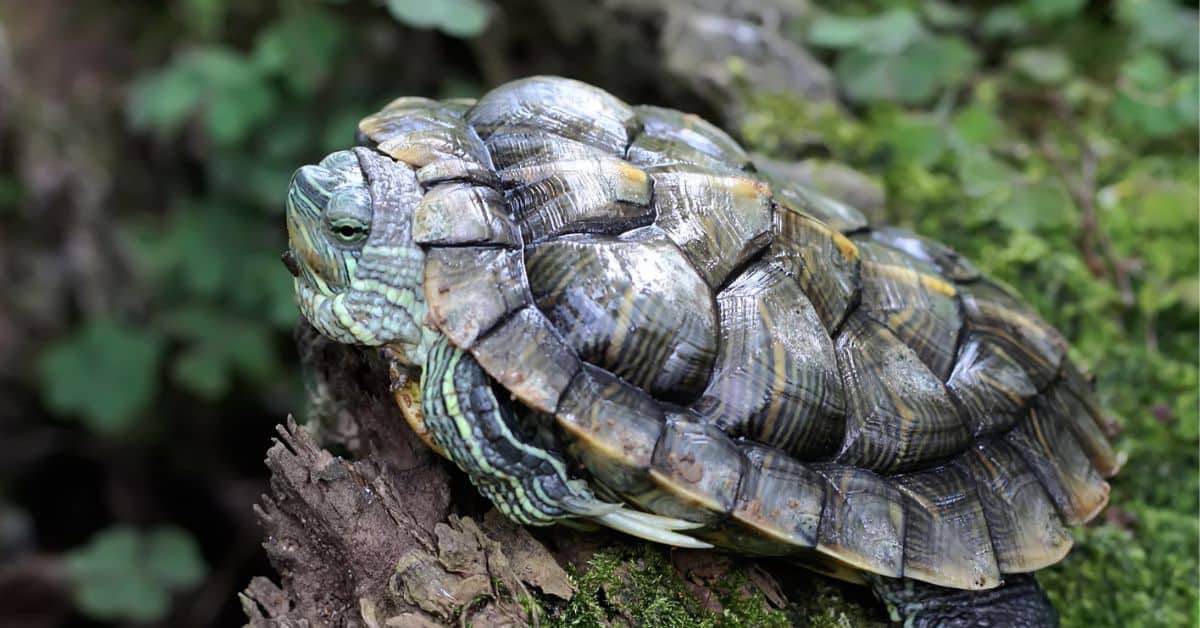Turtle Throat Puffing: Why, When, And What to Do

If you’ve decided to keep a pet turtle for the first time you’ll no doubt discover that there are a lot of things these adorable little creatures do that look scary on the surface but are actually pretty normal.
Throat puffing – making a motion most of us would associate with choking – is just one of those things!
And while turtle throat puffing can be a sign or symptom of more serious underlying medical conditions, that’s usually quite rare. Most of the time when a turtle is puffing out their throat they’re really just trying to get a little more air and taking a deeper breath.
Let’s dig a little bit deeper into the why, when, and what to do about turtle throat puffing.
Contents
Reasons Why Your Turtle Is Puffing Its Throat?
Taking a Deeper Breath
As we just mentioned a moment ago, the most common reason your turtle is going to be stretching and puffing their neck is just that they’re trying to get a little more air into its body.
Turtle shells may look big and spacious (especially on larger turtles), but these things are pretty tight and pretty constricting. By puffing out its neck your turtle is trying to make it easier to pull air into its body, opening up its airways and making life a little easier on itself.
You’ll usually see this happen when your turtle first emerges from spending a decent stretch of time underwater.
Respiratory Infection
At the same time, though, every now and again turtle throat puffing is a sign of a more serious medical condition that should be addressed ASAP.
Respiratory infection issues can cause a puffy neck that looks a lot like your turtle just by taking a deeper breath. Luckily, though, there are other signs and symptoms of a respiratory infection that help you better diagnose exactly what kind of throat puffing your turtle is doing.
For example, if your turtle is still acting normal – rambling around its enclosure, swimming, eating, and drinking there’s probably nothing to worry about.
If, on the other hand, you start to notice your turtle spending a lot more time floating on the water, moving slowly (even for a turtle), or acting kind of lethargic you might be dealing with a respiratory issue.
Excess mucus, wheezing and floating on the water while puffing out their neck are usually a sign of respiratory infections that need to be addressed ASAP.
Pneumonia
Pneumonia is another issue that can cause throat puffing in a turtle – and this is a medical issue that has to be dealt with straightaway or it can (if left untreated) turn deadly in a hurry.
You’ll be able to quickly diagnose your turtle with pneumonia if they are floating on the water sort of lopsided while puffing its neck, gasping for air, breathing through its open mouth, and by their shrieking or coughing sounds.
Pneumonia (and respiratory infections in general) can be treated pretty quickly, very effectively, and very affordably with over-the-counter turtle medications – more on that in just a minute – but you have to move swiftly.
Diet Changes
Finally, dietary changes can cause your turtle to puff out their throat as well.
Any food or dietary supplements that are high in sugar, high in sodium, or have any dairy whatsoever can really do a number on a turtle’s digestive system.
It’s important that you keep those kinds of foods and dietary supplements out of the turtle enclosure at all costs. Not only will they throw your turtle’s digestive system for a loop, but they also run the risk of making it much harder for your turtle to breathe, too.
How to Prevent Turtle Throat Puffing Issues
Preventing throat puffing (that isn’t happening just because your turtle needs to take a deeper breath) is actually pretty simple and straightforward.
Feed Quality Food
For starters, make sure that you are feeding your turtle quality food and supplementing it with the right vitamins and minerals (especially calcium).
A quality diet that’s dialed in will help your turtle live a long, happy, and healthy life.
Keep Their Shell Clean
Secondly, you want to make sure that you are regularly cleaning your turtle’s shell.
Believe it or not, dirty turtle shells are the number one cause of infection and disease in turtles. The shell is a living part of their body (just like our skin is) and any infections or diseases on the shell are going to move rapidly through the rest of the turtle’s body.
Cleaning their shell also helps to keep it from rotting – something that would expose turtle nerves and bones and end their life in a hurry.
Clean the Tank and Water
Finally, you have to be sure that you are keeping your turtle enclosure and the water in the tank as clean as possible.
Most folks like to clean their tank at least once or twice a month, changing out the water on a regular and consistent basis (always treating and balancing the water for a couple of days before swapping it out, though).
If your turtle lives in a clean and healthy environment it’ll lead a longer and healthier life.
How to Fix Throat Puffing Problems
Antibacterial turtle remedies and over-the-counter turtle “treatments” can be added directly to your turtle tank to fight any respiratory infections or pneumonia conditions.
Just be sure that you are following the directions to the letter, only adding enough of this medicine to the tank to be effective without overloading the water in the process.
If your turtle is still having a tough time bouncing back after you’ve used these over-the-counter treatments you may need to seek out a turtle vet for heavier-duty prescription meds or possibly even turtle surgery – especially if the throat puffing is caused by an abscess.
Closing Thoughts
At the end of the day, the most common reason your turtle is puffing out their neck is simply that they’re trying to take a deeper breath and there’s nothing to worry about.
You’re only going to have to change their diet, get medicine, or seek out a vet if you notice turtle throat puffing and signs and symptoms of illness like lethargy, a turtle that won’t eat or drink, a mucus discharge, or long-term floating while puffing their neck as well.
If those are issues you’ve begun to notice swing into action straight away. Turtles are resilient but they need help to fight through these kinds of issues ASAP!




